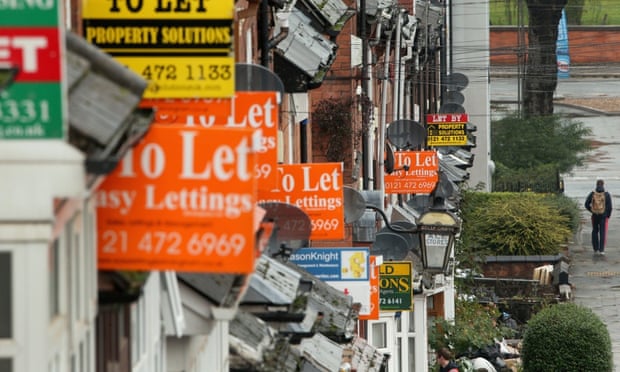Buy-to-let landlords and retirees risk squeezing out first-time buyers, data shows
03-04-2015
Newcomers already battling landlords armed with an average £100k deposit will in April face a wave of retirees armed with pension pot lump sums

Buy-to-let landlords
Buy-to-let landlords enter the UK property market with an average deposit of £100,000, data suggests. First-time buyers face more competition when pension changes in April allow retirees to withdraw lump sums. Photograph: Christopher Furlong/Getty Images
Hilary Osborne and Katie Allen
First-time buyers have been warned that they face increasing competition for properties as figures showed that buy-to-let landlords are looking for mortgages with deposits averaging almost £100,000.
Data from the Mortgage Advice Bureau (MAB) based on searches through the UK’s main price comparison sites showed that in the final quarter of 2014, people searching for a buy-to-let mortgage typically said they had £99,914 in equity to put down.
The figures include remortgages and new loans taken out to buy properties; according to mortgage lenders, in 2014 the market divided roughly in half between the two.
The amount of equity that buy-to-let landlords had was 15% higher than at this time last year, suggesting many have benefited from rising house prices.
Savings provider Scottish Friendly suggested first-time buyers “have just months left to buy a house or risk missing out on the chance of getting on the property ladder for years to come”.
The group, which offers insurance and investment products, said the imminent relaxation of pension rules in April meant newcomers to the market would be competing for properties with those retiring and keen to invest their funds in bricks and mortar.
“The baby-boomer generation has always had an unhealthy obsession with property,” said Neil Lovatt, director at Scottish Friendly.
“This has been manageable, even beneficial to the economy when people slowly climbed the property ladder. But the new pension rules will essentially bankroll a generation, allowing them to buy into an already over-inflated market in the expectation that it will help fund their retirement.”
MAB’s figures, which are based on 250,000 mortgage searches a month, of which arbout a quarter are for buy-to-let loans, showed landlords were typically seeking to borrow £129,964 of a £229,878 purchase price. This meant an average loan to value of 56.5%, allowing them to secure mortgage rates as low as 1.99%.
Brian Murphy, head of lending at MAB, said: “House prices have settled into a steadier pattern in recent months, but the current low rate environment offers many buy-to-let borrowers the chance to reassess their finances.
“It means this part of the market is likely to see strong activity this year, both from people who are already involved with BTL and others who are learning the ropes.”
There was some good news for first-time buyers, as Nationwide’s latest monthly house price index showed a 0.1% fall in February and an easing off in the annual rate of growth.
However separate figures from the Bank of England showed mortgage approvals rose for the second consecutive month in January, prompting some experts to predict house prices will start rising again soon.
The Nationwide report showed the annual rate of price inflation fell for the sixth month running to stand at 5.7% – less than half the 11.8% rate in June 2014 and its lowest level for 16 months.
The average price of a UK home has fallen back to £187,964, from the recent peak of £189,306 in August.
Nationwide’s figures, which are based on home loans it has approved during the month and adjusted to reflect a typical house, are the first to show prices for February.
They are in line with other indicators that have shown waning interest from buyers and a change of mood from a year ago when prices in London and south-east England were spiralling upwards.
Bank of England figures showed mortgage approvals continued to rise in January to hit a four-month high. There were 60,786 loans approved for home purchase, up from 60,349 in December.
Matthew Pointon, a property economist at the thinktank Capital Economics, said the housing market appeared to be nearing a turning point.
“House prices held their ground in February according to the Nationwide. But with mortgage approvals rising for the second consecutive month, and mortgage rates dropping yet again, prices will soon return to a gentle upwards trend,” he said.

